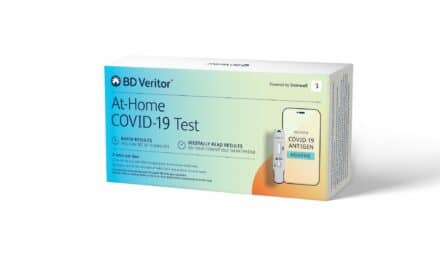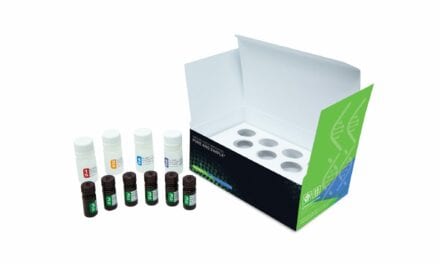A new partnership promises a focus on patient applications
Interview by Steve Halasey
At the beginning of October, Illumina, San Diego, and Qiagen, Hilden, Germany, and Germantown, Md, announced a 15-year partnership intended to broaden the availability and use of next-generation sequencing (NGS)-based in vitro diagnostic (IVD) kits for patient management.
The agreement grants Qiagen nonexclusive rights to develop and globally commercialize IVD kits to be used together with Illumina’s MiSeq Dx and NextSeq 550Dx systems. The agreement also includes rights for expansion of the partnership on future Illumina diagnostic systems. Both partners are also exploring opportunities for Qiagen to develop and market companion diagnostics based on Illumina’s TruSight Oncology (TSO) assays that enable comprehensive genomic profiling of tumor samples in immunotherapy.
Illumina and Qiagen will cooperate to commercialize a menu of clinically validated workflows that combine Qiagen’s proprietary content and bioinformatics solutions. The partnership will initially focus on commercializing oncology IVD kits to support patient management and may expand in the future to include additional clinical diagnostic fields, such as cardiology, hereditary diseases, and infectious diseases, as well as inflammatory and autoimmune diseases.
“We are committed to expanding the range of clinical use cases addressed by genomic sequencing by enabling partners to deliver IVD tests and companion diagnostics on Illumina’s Dx instruments,” said Francis deSouza, CEO of Illumina. “Our partnership with Qiagen will complement Illumina’s TSO 500 family with additional testing menu options, accelerating NGS adoption in oncology patient management.”
To find out more about the goals of the newly inked agreement between Illumina and Qiagen, CLP recently spoke to Jonathan Arnold, vice president and head of oncology and precision diagnostics at Qiagen.
CLP: Qiagen and Illumina are each longstanding leaders in molecular diagnostics. How did the idea of a nonexclusive partnership emerge?
Jonathan Arnold: Qiagen and Illumina want to accelerate the adoption of next-generation sequencing (NGS) in the clinical market. This approach has been gaining traction, but still needs strong collaborators to help develop the market and establish NGS as a routine diagnostic tool.
The partnership between Qiagen and Illumina accelerates the adoption of routine clinical NGS testing by bringing together synergies of Qiagen’s expertise in the development and commercialization of in vitro diagnostics (IVDs) and leadership in precision medicine—including regulatory experience, best-in-class clinical decisionmaking informatics, sample technologies, and IVD assay development—with Illumina’s best-in-class NGS instrumentation and related chemistries, and global commercial channels. This is a highly complementary package and will speed the decentralization of routine NGS testing to community clinical labs while maintaining a strong presence in central labs.
CLP: Both companies have a long history of partnering with other companies. For this new partnership, how do they view the fit of their strategic strengths and weaknesses?
Arnold: Strong partnerships have always been a key component of our business and success. Qiagen has always felt that it is important to work with strong companies that are dominant in their markets. Illumina fits this profile for NGS sequencing.
The partnership will allow both companies to leverage one another’s capabilities. There is great synergy between the two companies and that is the basis for a good partnership. Qiagen already offers platform-agnostic universal solutions for research with other companies’ sequencers, and many of our customers are also Illumina customers, so there has always been a close connection. This relationship will be further enhanced because IVD development requires close collaboration and cooperation to meet the requirements of regulatory agencies.
Additionally, both companies’ sales channels complement one another, further enhancing the strategic fit of the partnership.
CLP: The field of next-generation sequencing for clinical applications has been slow to develop. Why do you think that is?
Arnold: NGS is a disruptive technology and its pace of innovation has been very rapid—much faster than healthcare providers can react to. Successful market development requires a concerted effort across multiple fronts, including payors and physicians. It takes a significant amount of time, investment, and education for new diagnostic algorithms to be broadly accepted across global healthcare systems.
CLP: How will the Qiagen-Illumina partnership help to accelerate the development of novel NGS-based commercial in vitro diagnostics? Do you also foresee the creation of kits for laboratory-developed tests?
Arnold: Qiagen will leverage its strengths in companion diagnostic development and commercialization. In companion diagnostic development, Qiagen will pursue projects with a focus on custom panels with unique targets specified by a pharmaceutical company for a specific clinical program. This will ensure novel content development to support pharmaceutical companies’ clinical programs.
Qiagen will also provide a universal companion diagnostic NGS test that may incorporate Illumina’s TruSight Oncology portfolio. Such a universal companion diagnostic could act as a comprehensive cancer genome profiling solution, covering multiple partners and multiple companion diagnostics claims. Such a tool would, of course, further boost the efficiency and adoption of the NGS technology.
CLP: What about adoption? It seems uptake of NGS in research settings has been strong, but clinical lab sites have been slow to adopt. How will the partners address clinical lab adoption?
Arnold: The paradigm of basic research to translational research and ultimately to the clinic is a normal process many technologies follow. This partnership will help accelerate a deeper penetration into clinical labs by combining the strengths of both companies to develop a true sample-to-insight NGS solution. Such a complete solution, with improved ease of use, is what many laboratories need to support adoption.
Additionally, Qiagen’s best-in-class clinical decisionmaking informatics help to reduce the complexity of analyzing and interpreting NGS data. That has also been one of labs’ major barriers to adoption.
CLP: How did the partners decide to focus first on “commercializing oncology IVD kits to support patient management”? How do they view the opportunities in that field?
Arnold: Oncology testing is a well developed and defined market for NGS testing. As a multiplexing technology, NGS really lends itself to oncology testing by allowing multiple biomarkers to be sequenced at the same time. With more traditional molecular technologies, oncology diagnostic testing often has to pursue a sequential strategy of one test after another to fully define the clinical profile of the patient. NGS testing allows all key targets to be addressed at the same time, allowing a significant improvement in patient care.
CLP: The companies announced that areas of interest “may expand in the future to include additional clinical diagnostic fields, such as cardiology, hereditary diseases, infectious diseases, as well as inflammatory and autoimmune diseases.” Are there any priority opportunities in those fields?
Arnold: The initial focus will be on cancer, where the teams will utilize the experience and know-how of NGS assay development for applications such as gene-fusion analysis, microsatellite instability, tumor inflammation gene expression, tumor mutational burden, and novel sensitive sequencing applications such as liquid biopsy analysis.
Outside of oncology, we will continue to explore opportunities where NGS is a good fit. Infectious disease testing shows good promise, and the other segments are important to ensure that Qiagen can meet its pharmaceutical customers’ requirements for companion diagnostic development in broad therapeutic categories.
CLP: The partners will also be developing combination diagnostics, which suggests further partnerships with biopharma companies. Any idea how that will work?
Arnold: Immunooncology is a promising field for Qiagen. Beyond our partnership with Bristol-Myers Squibb to develop gene-expression profiles using NGS technology for immunooncology therapies, we are currently exploring combinatorial testing with multiple biomarkers across DNA and RNA. Additionally, Qiagen offers its sample preparation and bioinformatics solutions to customers in both research and clinical settings working on immunooncology.
CLP: What do you think the most important benefits are for each of the partners?
Arnold: The agreement complements Qiagen’s NGS strategy, which includes the development of universal solutions for research use with any sequencer, the GeneReader NGS system for use primarily with targeted gene panels, and now also the ability to serve customers in their increasing requirements for larger and more complex panels for biomarker testing.
Qiagen will leverage its strength in companion diagnostics to drive successful development and commercialization of the Qiagen IVD NGS portfolio, and to accelerate potential entry into new disease areas.
CLP: It’s hard to foresee where the partners will be 15 years from now. But how do you see the partnership influencing the direction and pace of NGS-based diagnostics development and adoption over the next few years?
Arnold: It is impossible to predict the long-term future, but it is our goal to accelerate the use of NGS in the clinical market much more rapidly together, thereby enabling patients to gain faster access to novel treatment options.
Steve Halasey is chief editor of CLP.
Featured image: Genetic sequencing concept. Image © Leigh Prather courtesy Dreamstime (ID 40820261).







